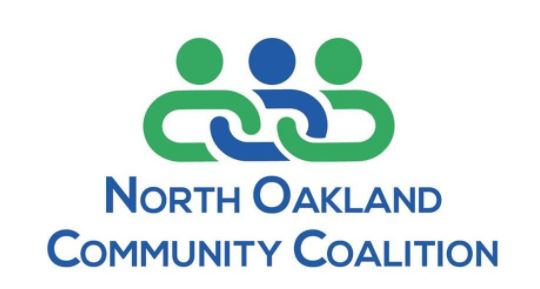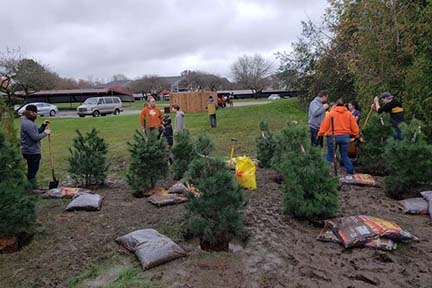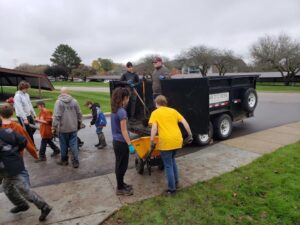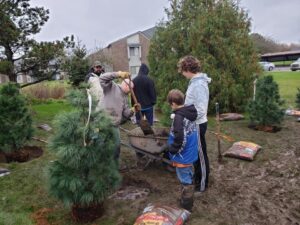
Legislation Enabling Michigan to Attract Billions in Investment

FOR IMMEDIATE RELEASE December 20, 2021 Contact: Press@michigan.gov
Governor Whitmer Signs Legislation Enab Bipartisan bills will support small businesses and invest in a $1 billion economic development fund, build on Michigan’s ongoing economic momentum
DETROIT, Mich. – Governor Gretchen Whitmer today signed the bipar
The governor signed House Bill 4603 to create a $1 billion economic development fund to ensure the state can compete for billions of dollars in investment and attract tens of thousands of jobs to bolster our economy. The governor signed Senate Bill 771 to create a $500 million fund to make our economy more adaptable to the rapid pace of technological change, supporting small businesses, and creating or retaining good-paying jobs. Additionally, the governor signed Senate Bill 769 to create a financing mechanism for both programs and Senate Bill 85 to provide full funding to start delivering for Michiganders right away. SB 85 will also provide direct assistance to small businesses affected b
“Today, I signed a package of bills that will put Michiganders first and continue building on our economic momentum,” said Governor Gretchen Whitmer. “Thanks to the effective collaboration between legislative leadership, my administration, and community and business leaders, I signed bills that will back small businesses and empower Michigan to grow and attract billions in investment and create tens of thousands of good-paying jobs. Because both parties in the legislature came together, our state will be able win huge, transformational projects and compete effectively for every dollar and every job for decades to come. The critical economic development fund we have set up will pay massive dividends as we continue staying focused on growing our economy, creating good-paying jobs, and lowering costs for families. We also delivered resources direc
At the bill signing, Governor Whitmer was joined by House Speaker Jason Wentworth and Senate Majority Leader Mike Shirkey, who were instrumental in the passage of these bills.
“Michigan is a great place to live, work, and raise a family. But our business climate is still holding us back from what we can be. Small businesses are struggling to fully reopen, large employers are picking other states for long-term investments, and far too many local workers are still on the sidelines. We need to step in and provide a shot in the arm that will lead to new opportunities for everyone. That is exactly what these bills do,” said House Speaker Jason Wentworth. “With this plan, we are giving small businesses a way to create new jobs in every corner of the state. We are helping large employers keep more opportunities here at home where they belong. And we are providing certainty, stability and opportunity to people worried about making ends meet when they sit down to pay their monthly bills. Those are the kind of results hard-working families need to see from their state government.”
“With the actions we are affirming today, we are not just demonstrating Michigan is ‘in the game,’ we are establishing our seat at the table, side by side with investors who recognize the value of Michigan and its unique assets,” said Senate Majority Leader Mike Shirkey. “Purposeful budgeted actions will now replace the uncertainty of mortgaged futures. This first significant step must be accompanied by a disciplined commitment to improving and leading in every category, and, most importantly, friendly to moms and dads and families.”
“Make no mistake: this is an important beginning,” said Quentin L. Messer, Jr., CEO of the Michigan Economic Development Corporation. “We appreciate the incredible diligence, hard work and collaborative approach to position Michigan for large-scale investments that accelerate growth in high-paying jobs, retain large customers for our small businesses and remain at the center of technological change for decades to come.”
“This bipartisan legislation sets a new and transparent foundation for economic development that helps boost our state’s competitiveness and is open to job providers of all sizes and industries,” said Jim Holcomb, incoming president & CEO of the Michigan Chamber of Commerce. “It’s also a shining example of the smart public policy that can be achieved when both parties and the Governor and Legislature work together.”
“Michigan must out-compete other states to attract and retain manufacturing investment. I’m pleased to say that this package puts Michigan in the game for transformational investments as the auto industry and the component supply chain quickly evolves from the internal combustion engine to electric and autonomous vehicles,” said John Walsh, President and CEO of MMA. “We commend Legislature and the Whitmer Administration for working together and coordinating closely with the manufacturing industry to allow us to engage in the interstate battle for current and future jobs and investments.
“We hope the hard work done here by Governor Whitmer, the legislature and all the business groups involved can provide businesses some respite from their continued struggles,” said MLBA Executive Director Scott Ellis. “The goal was to provide some assistance to the businesses that faced the greatest financial hardships and I believe this funding successfully achieves that objective.”
“Economic Development Leaders for Michigan formed in 2020 to encourage bold action for Michigan’s economic development policy. Today, we are pleased with the passage and signing of the SOAR funds and the crucial first step the legislature and Governor Whitmer have taken to stimulate investment in our great state,” said Rob Cleveland, CEO of Cornerstone Alliance, Member of Economic Development Leaders for Michigan. “We look forward to continued efforts with statewide and local partners to ensure a long-term, comprehensive economic development strategy to attract both talent and job-creators to Michigan, grow our economy, and generate prosperity in every corner of this dynamic, diverse state.”
“Big bipartisan wins for Michigan are increasingly rare, especially ones that have a transformative impact on our economy. Michigan created and owned the automotive industry since its inception, but leadership today does not ensure leadership into the future — especially in light of other states gunning for our assets,” said Sandy Baruah, President and CEO of the Detroit Regional Chamber. “The Chamber and MICHauto, along with partners across the state, are proud to have worked with the Legislature and Governor’s office to pass the biggest bipartisan deal in Michigan since the 2019 bill signing at the Mackinac Policy Conference, which will allow our state to compete and win the jobs of the future.”
Michigan’s Economic Momentum Michigan added 145,000 jobs in 2021, including 67,000 in the last three months, rounding out seven straight months of job growth and bolstering economic momentum. Today’s legislation will empower Michigan to create tens of thousands more jobs.
Economic Development The Michigan Economic Development Corporation (MEDC) has several transformational proje
Small Business Support Through COVID-19, the Whitmer-Gilchrist administration set up 23 economic relief programs delivering over $240 million to small businesses in all 83 Michigan counties. These grants supported over 25,000 companies, retained over 200,000 jobs with nearly 75% of the support going to restaurants, bars, retailers, and other service industry small businesses.
|








 The Michigan Department of Natural Resources is accepting candidates for the positions of conservation officer recruits and probationary conservation officers.
The Michigan Department of Natural Resources is accepting candidates for the positions of conservation officer recruits and probationary conservation officers.




